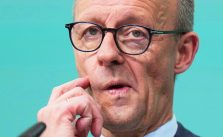Following the election victory of Germany’s opposition conservatives, calls sounded throughout the republic on Monday urging leaders to get to work and form a government as soon as possible, as Europe’s biggest economy faces a mountain of challenges.
The election saw Germany take a big step to the right, with the conservative bloc – made up of the Christian Democrats (CDU) and the Bavaria-only Christian Social Union (CSU) – securing a clear victory with 28.5%.
Thee far-right Alternative for Germany (AfD) came in second at 20.8%, doubling its result from the last election in 2021, the best for a far-right party in Germany’s post-Nazi history.
With the CDU/CSU bloc having ruled out a coalition with the anti-immigrant AfD, they are now widely expected to begin coalition talks with the Social Democrats (SPD) of outgoing Chancellor Olaf Scholz.
Both sides made it clear on Monday that they believe that the road to potentially forming a government will be a difficult one, while signalling willingness to start negotiations as soon as possible.
Conservatives eager to talk
German conservative leader Friedrich Merz, who looks set to replace Scholz once a government has been formed, said on Monday he was planning to talk to the SPD’s chairman later that day to discuss coalition negotiations.
“I am determined to hold constructive, good and speedy talks with the Social Democrats,” the conservative leader said after consultations with senior CDU members in Berlin, adding he hoped this would enable to him to form a government “by around Easter” at the end of April.
Merz conceded that the initial circumstances might be difficult but said he was confident that solutions could be found, naming migration, economic policy and foreign and security policy as top priorities for potential talks.
Merz will have to find agreement with a future coalition partner on a host of issues, including how to finance the budget, boost Germany’s ailing economy and increase defence spending in view of changing trans-Atlantic ties under Donald Trump and the Russian invasion of Ukraine.
Migration could be another major sticking point. After the campaign was overshadowed by a number of deadly attacks by immigrants, Merz vowed a strict crackdown on migration, including rejecting asylum seekers at Germany’s borders – a demand that is unlikely to sit well with left-leaning partners like the SPD.
Thorsten Frei, a senior CDU lawmaker, urged the SPD to put party interests behind those of the country, after the SPD was relegated to third place at 16.4%, in what was the party’s worst result in its history.
“Now is not the time to discuss wishes. We too might have wished for different conditions for forming a government,” Frei said.
Partnering with the SPD would give the conservatives a narrow majority of 328 out of the 630 seats in parliament, according to preliminary results.
SPD expects difficult talks
SPD deputy leader Klara Geywitz pointed to differences on how to kick-start the economy as a potential stumbling block in future talks.
“Friedrich Merz’s CDU has presented an election programme that would tear additional multibillion-euro holes in the already strained budget,” she told local radio station rbb inforadio.
“In this respect, we are at the beginning of a very difficult process, the outcome of which is still open in my view,” Geywitz said.
The CDU/CSU bloc has vowed to cut taxes to boost Germany’s ailing economy, while the SPD is in favour of taxing top earners more heavily.
SPD General Secretary Matthias Miersch also said he expects negotiations with the conservatives to be difficult, announcing that the Social Democrats would put the final decision to its members.
Speaking on a morning programme of public broadcaster ARD, Miersch said: “Nothing is automatic, but the democratic centre must of course try to work together in these times.”
All mainstream parties have ruled out working with the far-right AfD, which is being monitored by domestic intelligence as a suspected far-right extremist group.
Political map redrawn
Sunday’s election resulted in a major upheaval of the status quo, heralded by the implosion of Scholz’s centre-left coalition with the Greens and the pro-business Free Democrats (FDP) in November.
Vice Chancellor Robert Habeck said on Monday he plans to step back from any leadership role in the Greens after his party slumped to 11.6% in the election, down from 14.7% in the last election in 2021.
“I will no longer claim or aspire to a leading role in the Green Party’s personnel line-up,” Habeck, who stood as the top Green candidate in the campaign, said at a press conference in Berlin on Monday morning.
Habeck said that an enormous amount “shifted” during the election campaign. He described it as “shocking” how the AfD and their extremist anti-immigrant rhetoric became part of the mainstream.
The liberal FDP meanwhile failed to clear the 5% hurdle usually needed to take seats in parliament, prompting its leader and former finance minister in the Scholz administration Christian Lindner to announce is resignation on election night.
A surprise winner of the night, The Left party garnered 8.8% on what observers see as opposition to the country’s rightward course, particularly among younger voters.
It came after the hard-left party had languished below the 5% threshold for months, after leading party figure Sahra Wagenknecht quit The Left in 2023 to form her own group, the Sahra Wagenknecht Alliance (BSW).
Following initial success in regional elections for the populist BSW, which campaigned on a mix of anti-immigration and left-wing economic policies, Monday’s preliminary results showed that the party came in at 4.97%, narrowly missing their chance to enter parliament at national level.
Wagenknecht on Monday morning suggested the BSW would consider legal action. The fact that the party fell about 13,400 votes short “raises the question of the legal validity of the election result,” she said.
(dpa)

